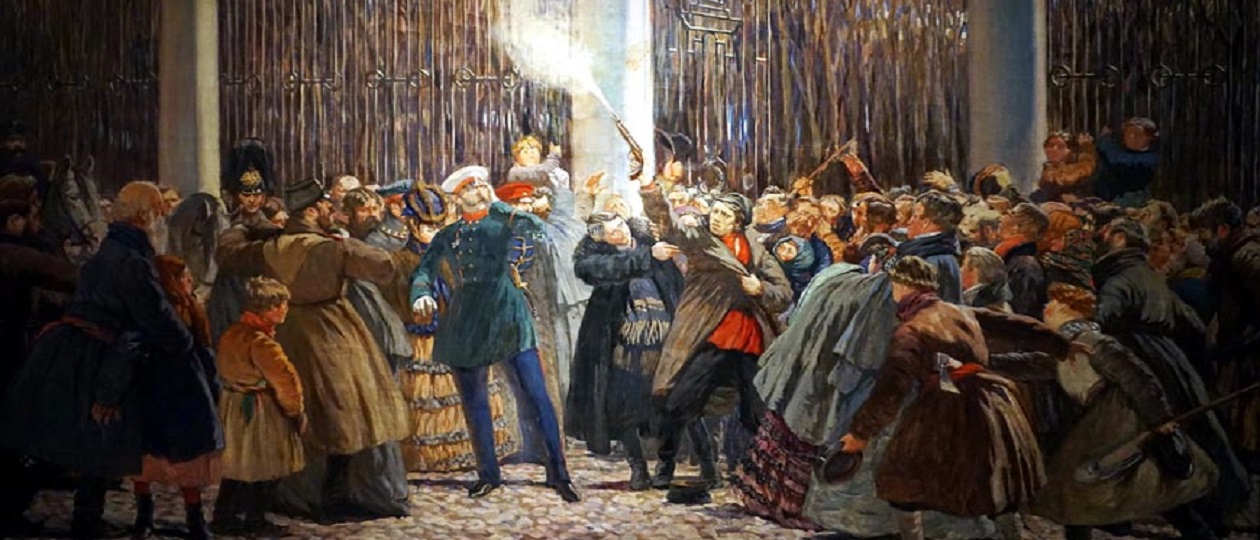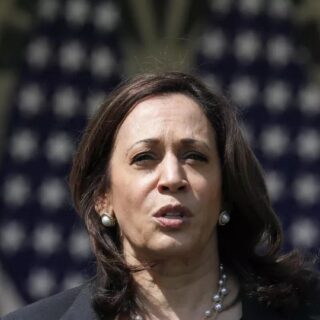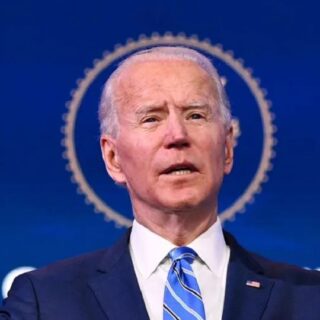
The conspiratorial activity of the People’s Will [Народная Воля] gave birth to the conspiratorial activity of the loyalist Sacred Brotherhood [Святая Дружина].
Just as the narodovol’tsy [members of the People’s Will] saw themselves engaged in single combat with the autocracy, the druzhinniki [дружинники, members of the Sacred Brotherhood] saw themselves as engaged in single combat with the People’s Will.
Although historians often ridicule the druzhinniki as amateurs, the Sacred Brotherhood should be taken seriously. It was the first major anti-revolutionary organization in the Russian Empire, and it was the forerunner of the far-right Black Hundreds movement in the early 20th century. Furthermore, since the Sacred Brotherhood planned to fight revolutionary terrorism with loyalist terrorism, the Brotherhood was the forerunner of the Black Hundreds fighting squads during the Revolution of 1905-1907.
As well, the government’s suspicions about the true goals of the Sacred Brotherhood demonstrated how the autocracy mistrusted any public initiative, even from the most loyal elements. The Black Hundreds also aroused government suspicion about their potential disloyalty.
What made the situation even murkier in the period after the assassination of Tsar Alexander II on March 1, 1881, was the emergence of liberal secret societies. Historians still argue if the liberal Land Union [Земский Союз] was a legitimate liberal organization or just a provocation by the Sacred Brotherhood to deceive liberals and socialists.
The Land Union and other liberal groups in the period also need to be taken seriously because several of their members became leaders of the liberal Constitutional-Democratic Party [Конституционно-Демократическая Партия], known as Kadets, during the Revolution of 1905-1907. Much of the liberals’ sympathetic attitude toward the People’s Will shaped the sympathetic attitude of liberals toward leftist terrorists in the 20th century.
The Party of Socialists-Revolutionaries [SRs] saw itself as the successor of the People’s Will. Consequently, this period in the late 1870s-early 1880s foreshadows many of socialist, liberal, and far right trends in the 20th century.
Opposition from the Right
The reign of Tsar Alexander witnessed not only the emergence not only of revolutionary socialist and liberal oppositionist movements, but also sparked the emergence of conservative and reactionary oppositionist movements.
The right-wing camp in Russia had many variations. For example, Slavophiles generally idealized the old Muscovite order before the reforms of Tsar Peter the Great and continually emphasized how Russia was totally different from Europe. However, many Slavophiles also favored the establishment of a consultative Assembly of the Land [Земский собор] and they considered the bureaucracy a wall separating the tsar from his people. Certain government officials could regard Slavophile criticism of the bureaucracy and calls for the establishment of an Assembly of the Land as a threat to the authorities.
More and more the bureaucracy became a target of criticism by liberals, conservatives, and reactionaries. Liberals often emphasized that administrative arbitrariness, especially in the universities and secondary schools, caused the radicalization of youth. Conservatives often accused bureaucrats of playing liberal games with leftists and taking a soft attitude toward leftist radicals.
A particularly vehement critic of the bureaucracy was Mikhail N. Katkov, publisher of the influential Moscow News [Московские ведомости]. In his criticism of the <<St. Petersburg bureaucrats>>, Katkov claimed << bureaucratic procedures dominate all of our doing and dominate exclusively; all of our doings move through bureaucratic organizations, all of the practices and doings of our government are bureaucratic properties >>. Katkov opposed the great reforms beginning with the emancipation of the serfs in 1861 and feared that the reforms were turning Russia into a European state. He accused the political police of not being strong enough to fight the revolutionary movement and complained that the presence of so many Baltic Germans and Poles in the higher bureaucracy was separating the tsar from Katkov’s attacks on the presence of non-Russian elements in the government, revolutionary movement, and liberal opposition became a favorite theme of Russian nationalists.
Katkov considered the revolutionary movement the logical result of the spoiled nature of society and the weakness of the authorities. He regarded the assassination of the tsar as a punishment for the political stupidity and faintheartedness of society and government and concluded that only an unlimited autocracy, as a truly Russian phenomenon could overcome party divisiveness and unite the people with the authorities.
The criticism of the government by Slavophiles, conservatives, and reactionaries goes a long way toward explaining why the government could not establish anti-revolutionary circles even though the suggestion sometimes surfaced. Any discussions about the revolutionary movement would have sparked criticism of the government, especially since many people considered the government incapable of fighting the revolutionary movement and infiltrated by traitorous elements. This mentality was one factor that sparked the formation of the Sacred Brotherhood. The same anti-bureaucrat mentality surfaced on an even bigger scale in the 20th century and led to a weakening of support for the government in its fight against terrorism and other types of violence.
Fighting Terrorism with Terrorism
The Sacred Brotherhood was supposed to be a secret loyalist organization, but many people knew about its activities. Some members of the People’s Will engaged in negotiations with members of the Brotherhood about the possibility of obtaining political concessions from the government, such as a constitution or parliament, in exchange ending terrorism. But the police were better informed about the weakened position of the People’s Will after the assassination of Tsar Alexander II and put an end to the negotiations.
The Sacred Brotherhood was largely made up of senior bureaucrats and aristocrats and had several hundred members. This hierarchical conspiracy was organized soon after the assassination of the tsar, but it was dissolved by the government in late 1882. Members of the government suspected that the supposedly loyalist statements of the druzhinniki were a cover-up for an aristocratic movement for a constitution. The Brotherhood, as members of the government believed, had too many parallels with the French Fronde of the 17th century — aristocratic struggle with the king.
The druzhinniki believed in <<direct infiltration into the heart of the social-revolutionary party in order to find out their membership and collect information about their criminal work. It was thought that if this work of infiltration was conducted from many sides at once, it would be easier to encircle the revolutionary milieu with its multifarious ramifications, and easier also to push ahead with intelligence work>>. This would have placed the Sacred Brotherhood in direct competition with the Department of Police.
Many druzhhiniki felt that the terrorism of the People’s Will could only be crushed by loyalist terrorism. Not surprisingly, they saw themselves as engaged in single combat with the revolutionaries who they believed were tightly connected to the liberals and traitorous elements in the bureaucracy. However, any terrorist fantasies by the Brotherhood went nowhere.
The major activity of the Sacred Brotherhood was sowing discord among socialists and liberals. This was done by publishing three newspapers — the liberal <<Free Word>> [Вольное Слово] and the ultra-radical <<Truth>> [Правда – Pravda] in Geneva, Switzerland, and the liberal <<Moscow Telegraph>> [Московский Телеграф]. The editor of Pravda published venomous attacks upon the <<Free Word>>, called upon revolutionaries to exterminate the nobility, burn their estates, and kill their cattle. He described constitutionalism as a bourgeois enterprise and completely incompatible with socialism.
In 1882, the editors of the <<Free Word>> announced that the newspaper had become the organ of the liberal Land Union. Some historians believe that the Land Union was a provocation by the Brotherhood to sow discord among liberals. Other historians believe that the Land Union was a legitimate liberal organization that originated in Kharkov in March 1881 and that it drew its members from liberal circles in the late 1870s agitating for a constitution.
Police regarded the Sacred Brotherhood as a threat and accused its leaders of harboring a secret constitutionalist conspiracy and attempting to blackmail the government into enacting reforms. Thus ended the grand attempt of the Russian aristocracy to defend Tsar Alexander III by engaging in knightly combat with the People’s Will.
A Conspiratorial Mystery Storu
The story of the People’s Will, Sacred Brotherhood, and Land Union is one of the murkiest periods in Russian political history. There are still too many unanswered questions about the relationships of these three organizations. However, the history of these conspiracies and illegal groupings foreshadowed certain trends in political life in the Russian Empire in the early 20th century. The government’s suspicions about the alleged loyalty of the Brotherhood were repeated by its complex relationships with the Black Hundreds. For too many reasons, the government could not rely upon unqualified support from reactionaries and conservatives who often pushed for their own << revolution from the right>>.
The next article explores one of the most controversial chapters in the history of the People’s Will — how certain narodovol’tsy supported anti-Jewish pogroms [mob attacks] as the first step towards a people’s revolution. Their approval of pogroms was a landmark in the history of left-wing antisemitism .
Citations
- Fischer, George. Russian liberalism: from gentry to intelligentsia. Cambridge MA: Harvard University Press, 1958.
- Сафронова, Юлия. Русское общество в зеркале революционного террора: 1879-1881 годы. (Russian society in the mirror of revolutionary terror: 1879-1881). Москва: Новое литературное обозрение, 2014.
- Gilbert, George. The Radical Right in Late Imperial Russia: Dreams of a true Fatherland? London and New York: Routledge, 2016.
- Твардовская, В. А. Идеология пореформенного самодержавия (М.Н.Катков и его издания). (The ideology of the reformed autocracy: M.N.Katkov and his publications). Москва: Наука, 1978.
- Рокки Тони. Идеологическое и тактическое оружие организации «Народной воли» : как народовольцы стали легендарными в истории терроризма (The ideological and tactical weapons of the People’s Will organization: how the narodovol’tsy became legendary in the history of terrorism). // Сборник материалов VIII Международной научно-практической конференции. 7–9 октября 2020 г. Тула-2021, с. 421-432.
- Lukashevich S. The Holy Brotherhood: 1881-1883. // The American Slavic and East European Review, Vol. 18, No. 4 (Dec., 1959), pp. 491-509.
- Butler, Nancy. Vol’noe Slovo and the ‘Zemstvo Union’: Was Russian Liberalism Dead in 1881? Canadian Slavonic Papers / Revue Canadienne des Slavistes, Spring/Printemps, 1974, Vol. 16, No. 1 (Spring/Printemps, 1974), pp. 14-38.





